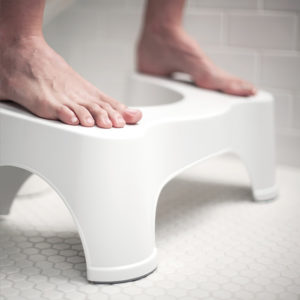
Moving our bowels is big business.
With 42 million constipated people in the U.S., experts say we spend more than $700 million a year on laxatives.
But what if the problem isn’t just your digestion? What if the design of modern toilets is twisting your colon into an unnatural position, making it difficult to “do your business” with ease?
Think about it: When toddlers fill their diapers, they squat down. It’s just natural.
In many countries, in-the-floor toilets are actually the standard offering.
Enter the Squatty Potty, a wraparound toilet stool that lets you prop up your feet and knees, thus straightening your colon for “effortless elimination.”
The inventor says it can prevent constipation, help you avoid hemorrhoids, keep your colon healthy and help you avoid urinary infections and pelvic floor issues.
The idea is catching on: It received funding on ABC’s Shark Tank, and you can easily find the stools at local department stores. You can also search online for build-it-yourself designs.
“In my opinion, the squatty potty isn’t a gimmick,” said Spectrum Health Medical Group gastroenterologist Randall Meisner, MD. “For some people, it can improve the angle of the rectum and relax the muscles that help us defecate.”
Backups happen
There’s very little scientific research on this topic, but a study in the Middle East—where squat toilets are common—found no significant benefit to squatting.
“It may not help all individuals, but it certainly may help people who notice difficulty actually getting the bowel movement to come out,” Dr. Meisner said. “It doesn’t hurt to give it a try.”
Those with ongoing problems should have an evaluation of the muscles that control the defecation process. A gastroenterologist or colorectal surgeon may suggest a colonoscopy or other radiographic tests to complete their diagnosis.
“There can be a variety of treatments for this condition, including physical therapy,” Dr. Meisner said.
He also pointed out that traditional constipation remedies, like adding fiber, won’t help if there’s a problem with muscles or a blockage.
“If there’s a backup on I-96, it doesn’t matter whether you line up five cars or 100 cars—it’s still not going to move,” he said.
Dr. Meisner said bowel problems shouldn’t be ignored. They can indicate very serious issues, including colorectal cancer.
 /a>
/a>
 /a>
/a>
 /a>
/a>
My squatty potty has changed my life !! I used to poop once a week ( with effort) now I poop effortlessly daily. Seriously folks, this is not a gimmick.